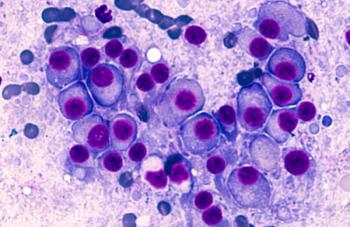
Clinical
Latest News
Latest Videos

More News

Reduced cost-sharing for asthma medications improved adherence to controller medications among patients with severe asthma.

The American Society of Nephrology (ASN) Kidney Week 2023 will take place in Philadelphia, Pennsylvania, from November 2-5, as experts from across the globe gather to discuss the latest innovations in renal care and current issues facing the field.

Patients being unaware of their hepatitis C virus (HCV) infection is preventing the World Health Organization (WHO) from accomplishing its goal of eliminating HCV and hepatitis B virus as public threats by 2030.

An overview of the HIMALAYA study and IMbrave150 trial are provided.

Medical experts discuss patient considerations when utilizing clinical pathways in HCC treatment.

Leaders from Every Cure and Moonshots for Unicorns highlight their work toward finding treatments for rare diseases currently without a cure.

April Armstrong, MD, MPH, of University of California, Los Angeles, discussed how recent biologics advancements improved moderate-to-severe atopic dermatitis (AD) treatment.

Children of all ages with achondroplasia are now included in the expanded Indication, the most common form of skeletal dysplasia leading to disproportionate short stature.

A study of patients with relapsed or refractory (R/R) multiple myeloma who received ixazomib-based therapy in real-world settings found the treatment effective and tolerable in clinical practice.

Patients with multiple myeloma exhibiting poor prognostic features, such as high-risk cytogenetics, soft-tissue plasmacytoma, ISS stage III disease, and triple-class exposure, experienced significant progression-free survival benefit with ciltacabtagene autoleucel.

The CDC found that the 2022-2023 influenza season had high severity among children and adolescents, resulting in them recommending that everyone receive the annual influenza vaccine by the end of October.

This case report details an incident of pembrolizumab-induced myasthenia gravis in an elderly male patient being treated for urothelial cell bladder cancer.

The most common conditions or concerns patients with atopic dermatitis (AD) reported having that may influence their selection of a JAK inhibitor included an increased risk of MACE and an age above 65 years.

New phase 1B data support further investigation into Adiso Therapeutic's prospective treatment.

Results from the AiDAPT trial show hybrid closed-loop therapy significantly improves maternal glycemic control during pregnancy complicated by T1D.

This study aimed to evaluate the association between the disease burden of psoriasis and the switching of systemic biologic therapies in patients with both psoriasis and psoriatic arthritis.

Researchers identified an optimal early relapse time point to incorporate into traditional risk features and formed a novel prognostic classification utilizing both static and dynamic risk.

Posters presented at the American College of Gastroenterology's (ACG's) 2023 Annual Scientific Meeting examined potential environmental risks of eosinophilic esophagitis (EoE) on the pediatric population, as well as the presence of allergic comorbidities in children diagnosed with EoE.

Coverage from the Institute for Value-Based Medicine session with Florida Cancer Specialists & Research Institute.

Panelists share their final thoughts on staying updated with the latest advancements in the field.

Experts emphasize the crucial role of swift diagnostic testing, especially through liquid biopsies.

Specialists delve into strategies for monitoring treatment response and the importance of assessing symptoms during the initial three treatment cycles.

The discussion, "Understanding Biomarkers and the Role They Play in Oncology," came during the Community Oncology Alliance Payer Exchange Summit, held October 23-24 in Reston, Virginia.

The improvement in quality of life (QOL) seen with use of sacubitril/valsartan for heart failure with preserved ejection fraction (HFpEF) could potentially result in more favorable clinical results.

Results from a retrospective, matched cohort study suggested that valvular heart disease and aortic stenosis may contribute to disparities in cardiovascular disease–related mortality in patients with rheumatoid arthritis (RA).
















